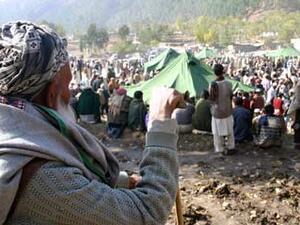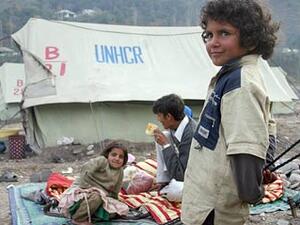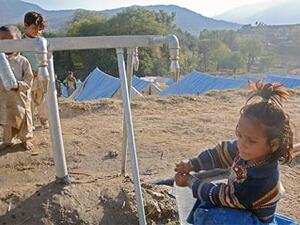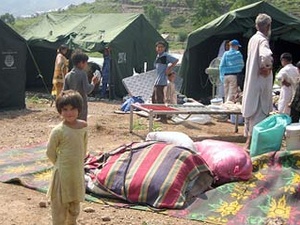South Asia earthquake: Freezing rain heralds onset of winter, disease reported in camps
South Asia earthquake: Freezing rain heralds onset of winter, disease reported in camps
Freezing rains in northern Pakistan are speeding up the race against winter and disease outbreaks, especially in the many relief camps that have sprung up in earthquake-hit areas. Temperatures dipped overnight because of the rain, which turned some quake-hit areas into fields of mud.
The need to improve water and sanitation has never been more urgent, with 300 cases of acute watery diarrhoea reported by WHO in a crowded spontaneous camp in Muzaffarabad. UNHCR and UNICEF are deploying a team to the affected areas to demonstrate to the army and NGOs running these camps some basic ways to maintain hygiene and health. This includes moving tents further away from latrines and water sources; weatherproofing tents by using plastic sheeting for insulation and rain protection; constructing earthen berms around tents; and decongesting some of the more crowded camps - either by increasing the space between tents or moving people to less congested sites.
Currently, there are 21 organised camps for more than 32,000 people set up by the Pakistan government with technical support from UNHCR and its partners, as well as hundreds of spontaneous settlements of varying size and condition - some of them quite poor. Pakistani officials have asked UNHCR to assist the army in trying to ensure better planning in these spontaneous sites, particularly those around Muzaffarabad, and we have just concluded an assessment of all the spontaneous camps in that area. We are proposing to the authorities that some sites be closed and others merged so that conditions can be improved for people living in them.
In Mansehra, meanwhile, UNHCR has deployed the first of 20 "quick impact" teams to fix technical problems in organised and spontaneous camps. They are bringing supplies (timber, WCs) to build latrines, and hiring plumbers, masons, carpenters and electricians to set up basic infrastructure in the camps. More UNHCR-funded mobile teams are being deployed, with a total of 32 teams - 20 technical teams plus 12 camp management teams - planned in Mansehra, Bagh and Muzaffarabad.
Meanwhile, winter supplies continue arriving in Pakistan from our stocks worldwide. The NATO/UNHCR airlift that began on October 19 from Incirlik, Turkey, has so far delivered 1,018 tonnes in 79 sorties. Five big trucks with supplies from our stocks in Iran are now on their way to Mansehra with 10,000 blankets, 4,000 mattresses, 3,000 plastic sheets, 2,000 kitchen sets and lanterns. An additional 360,000 blankets are on their way from Jordan, India and Turkey to allow people to insulate themselves as winter approaches.
Distribution on the ground is also ongoing. More than 2,000 family tents have been distributed this week to camps in Mansehra, Batagram and Shangla. Around Muzaffarabad, we've sent over 6,000 blankets, some 1,000 plastic sheets and 600 tents to villages like Lamian (2,100 metres above sea level), Sharian (in Jehlum Valley) and Mera Kalan near Bagh.
Altogether, we've so far distributed more than 10,000 family tents, over 22,000 plastic sheets, 30,000 blankets, thousands of jerry cans and kitchen sets, and hundreds of stoves and mattresses.
Three British Chinook helicopters will be made available next week to airlift another 2,000 UNHCR tents, 36,000 blankets, 6,000 plastic sheets, 4,000 jerry cans and 2,000 kitchen sets to the Lipa Valley, where 16,000 out of the total population of 35,000 are believed to be affected by the earthquake.









